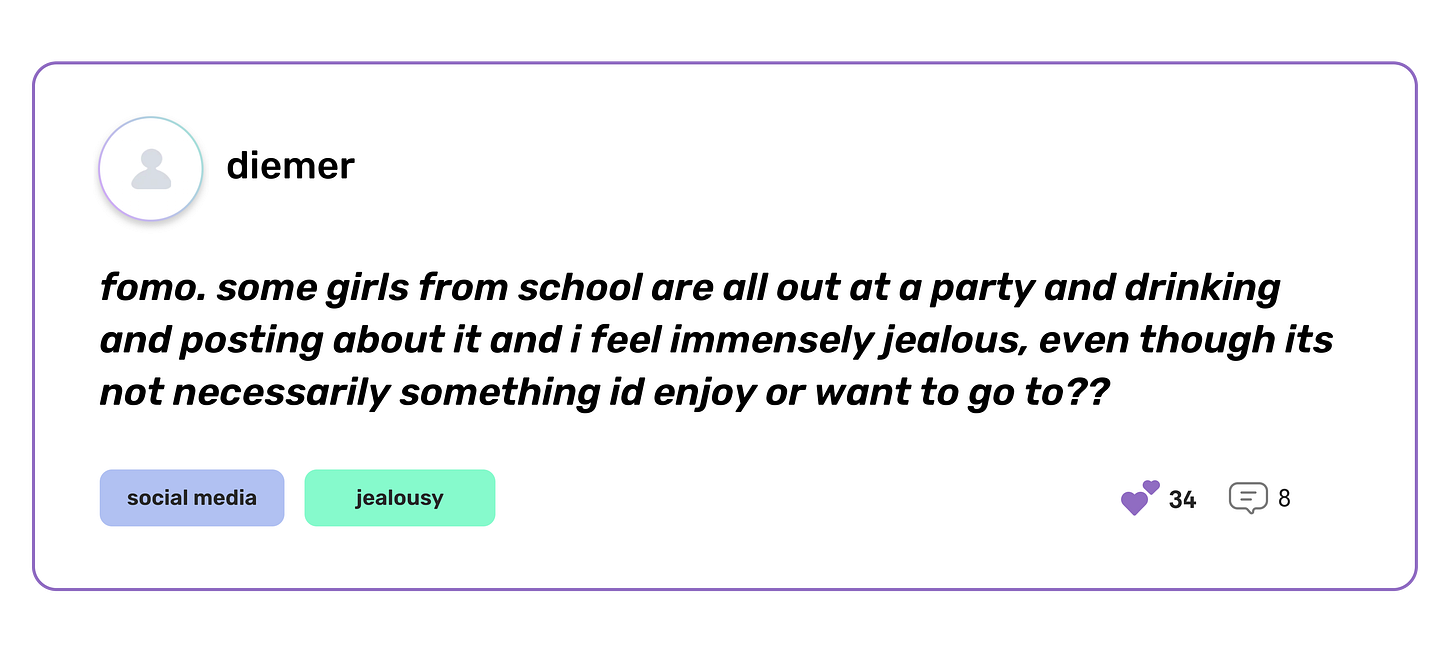Today’s essay is by Kate Lindsay, who writes the internet culture newsletter Embedded. Her work has appeared in The Atlantic, The New York Times, GQ, and Bustle.
I know this feeling all too well. In fact, I’d say my entire early twenties was spent tapping through my phone watching other people do seemingly fun things. I dreaded weekends when I first moved to New York. Fridays would arrive without any plans, which meant my Saturday mornings were often spent scrolling through pictures and videos of nights that were better than mine. Like you, it’s not that I necessarily wanted to be at a crowded bar or dancing in a club, but that seeing (what felt like) everyone else do those things without me made me feel rejected.
More often than not, I let those feelings of social media FOMO get the better of me. I would shoe-horn myself into any kind of social plan I could find in hopes that I, too, could have pictures and videos to post online. It felt more important to me to have a life that looked good on social media than one that felt good in real life. Because, despite how many pictures I posted, it didn’t feel better in real life. I’d be there thinking about how I wasn’t having fun, but would still try to make it look like I was online. A few days later, I’d see other people’s Instagram Stories, get jealous again, and the vicious cycle would repeat. Then one day, a friend surprised me with a confession: I was giving her FOMO.
“On Instagram,” she said, “It always looks like you’re doing something cool.”
I almost burst out laughing. This was so far from the truth! I was lonely all the time. But when people saw the pictures of me at a party, or getting a manicure, or drinking a latte, they didn’t know that I left after ten minutes, that the manicure was with my mom, or that getting coffee was the only time I left my house that day. They, like me, assumed these pictures were mere snippets of a non-stop amazing life.
Social media is not an objective lens. Everyone on it is, consciously or not, showing only the best parts of their life to curate it a certain way. It’s possible, too, that the way you perceive what you see on social media is tinted by your own insecurities—that you’re feeling lonely and rejected, and therefore, everyone else looks like they’re happy and popular. I know this was the case for me, and it took me years to realize the annoying but effective truth: if watching other people’s social media triggered these feelings in me, then I should opt-out.
I know stepping back is easier said than done. I would never tell someone the only solution is to completely cut themselves off from social media. Instead, it’s about setting digital boundaries. Identify the parts of being online that bring you anxiety and target them. Maybe give yourself a time limit on certain platforms, or don’t go on those platforms on weekends or evenings when you’re most likely to see this kind of stuff. If you’re worried that you won’t be able to stop yourself, then there is no shame in muting accounts that make you feel left out. Muting is the drama-free block, protecting your peace without making any kind of public statement. It’s your feed—make sure it’s only filled with things that make you feel good.
It took just a few days of Instagram Stories-sobriety, which I enacted for similar reasons two years ago, for me to wish I had done it sooner. I no longer use the platform to post about my day-to-day life. Now, when I go out and do things, they’re made all the more special by the fact that I’m just appreciating them, not using them to prove something to the internet. Because I’m not scrolling other people’s Stories, I’m not being bombarded with feelings of comparison or FOMO. Since I can’t see them, it’s stopped mattering that people are doing things that I wasn’t a part of. I’m in my own lane, not even thinking about them.
This Week’s Diem Commentary
Join these conversations (and more!) in Diem via our web, iOS, or Android app!
👀 What responsibility, if any, does “the other woman” (or other person) in an affair hold? Share thoughts as Kayla Kibbe discusses her latest ‘Sex at 26’ Cosmopolitan column in Diem.
👀 Am I too old to be sexy? Join the conversation.
👀 I’ve never had an orgasm. Like never ever. Any ideas about what might help or why nothing worked yet? Help this Diemer out.
👀 Has anyone started being attracted to women later in life but is too nervous to hook up with them? Share notes.
👀 Is anyone else on prescription tretinoin? How bad is your peeling? Exchange tips with this flaking Diemer.
👀 How do you reconnect with your partner after moving in together? We all want to know.
👀 My career is suddenly accelerating and I’m not sure how to handle it. Does anyone have any tips for how to learn quickly on the job? Be generous with your wisdom.
FYI! We launched the Diem app—Diem is designed to embrace the whims, questions, and hushed conversations that women have been having “behind closed doors” for centuries. Our community talks about topics just like this newsletter every day. Join us via web, iOS or Android.
If you want to try Diem before downloading, text your personal, funny, important, and thought-provoking questions to +1 (518)-855-3436 — (🇺🇸 #s only atm!)
Want to write an advice column for us? We’re looking for smart, generous, funny writing that engages with the questions asked in Diem. Have an idea? Email our editor Taylor Majewski at taylor@askdiem.com. We highly recommend you browse the questions asked in Diem before you pitch. Please provide at least two clips of your previous work.





